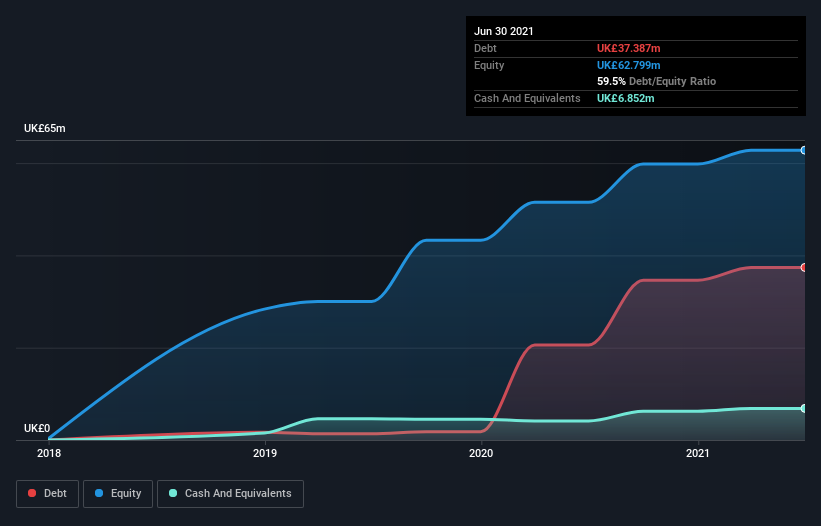David Iben put it well when he said, 'Volatility is not a risk we care about. What we care about is avoiding the permanent loss of capital.' When we think about how risky a company is, we always like to look at its use of debt, since debt overload can lead to ruin. We note that MBH Corporation PLC (FRA:M8H) does have debt on its balance sheet. But is this debt a concern to shareholders?
Why Does Debt Bring Risk?
Generally speaking, debt only becomes a real problem when a company can't easily pay it off, either by raising capital or with its own cash flow. Part and parcel of capitalism is the process of 'creative destruction' where failed businesses are mercilessly liquidated by their bankers. However, a more usual (but still expensive) situation is where a company must dilute shareholders at a cheap share price simply to get debt under control. By replacing dilution, though, debt can be an extremely good tool for businesses that need capital to invest in growth at high rates of return. The first step when considering a company's debt levels is to consider its cash and debt together.
See our latest analysis for MBH
How Much Debt Does MBH Carry?
As you can see below, at the end of June 2021, MBH had UK£37.4m of debt, up from UK£20.6m a year ago. Click the image for more detail. However, it does have UK£6.85m in cash offsetting this, leading to net debt of about UK£30.5m.

How Healthy Is MBH's Balance Sheet?
The latest balance sheet data shows that MBH had liabilities of UK£31.0m due within a year, and liabilities of UK£56.2m falling due after that. On the other hand, it had cash of UK£6.85m and UK£17.3m worth of receivables due within a year. So its liabilities outweigh the sum of its cash and (near-term) receivables by UK£63.0m.
This deficit casts a shadow over the UK£16.4m company, like a colossus towering over mere mortals. So we'd watch its balance sheet closely, without a doubt. After all, MBH would likely require a major re-capitalisation if it had to pay its creditors today.
In order to size up a company's debt relative to its earnings, we calculate its net debt divided by its earnings before interest, tax, depreciation, and amortization (EBITDA) and its earnings before interest and tax (EBIT) divided by its interest expense (its interest cover). Thus we consider debt relative to earnings both with and without depreciation and amortization expenses.
Weak interest cover of 2.5 times and a disturbingly high net debt to EBITDA ratio of 7.3 hit our confidence in MBH like a one-two punch to the gut. This means we'd consider it to have a heavy debt load. Another concern for investors might be that MBH's EBIT fell 18% in the last year. If things keep going like that, handling the debt will about as easy as bundling an angry house cat into its travel box. There's no doubt that we learn most about debt from the balance sheet. But it is future earnings, more than anything, that will determine MBH's ability to maintain a healthy balance sheet going forward. So if you're focused on the future you can check out this free report showing analyst profit forecasts.
Finally, a business needs free cash flow to pay off debt; accounting profits just don't cut it. So we always check how much of that EBIT is translated into free cash flow. In the last three years, MBH's free cash flow amounted to 36% of its EBIT, less than we'd expect. That weak cash conversion makes it more difficult to handle indebtedness.
Our View
To be frank both MBH's net debt to EBITDA and its track record of staying on top of its total liabilities make us rather uncomfortable with its debt levels. But at least its conversion of EBIT to free cash flow is not so bad. Taking into account all the aforementioned factors, it looks like MBH has too much debt. That sort of riskiness is ok for some, but it certainly doesn't float our boat. When analysing debt levels, the balance sheet is the obvious place to start. But ultimately, every company can contain risks that exist outside of the balance sheet. These risks can be hard to spot. Every company has them, and we've spotted 6 warning signs for MBH (of which 1 makes us a bit uncomfortable!) you should know about.
When all is said and done, sometimes its easier to focus on companies that don't even need debt. Readers can access a list of growth stocks with zero net debt 100% free, right now.
New: Manage All Your Stock Portfolios in One Place
We've created the ultimate portfolio companion for stock investors, and it's free.
• Connect an unlimited number of Portfolios and see your total in one currency
• Be alerted to new Warning Signs or Risks via email or mobile
• Track the Fair Value of your stocks
This article by Simply Wall St is general in nature. We provide commentary based on historical data and analyst forecasts only using an unbiased methodology and our articles are not intended to be financial advice. It does not constitute a recommendation to buy or sell any stock, and does not take account of your objectives, or your financial situation. We aim to bring you long-term focused analysis driven by fundamental data. Note that our analysis may not factor in the latest price-sensitive company announcements or qualitative material. Simply Wall St has no position in any stocks mentioned.
Have feedback on this article? Concerned about the content? Get in touch with us directly. Alternatively, email editorial-team (at) simplywallst.com.
About DB:M8H0
MBH
An investment holding company, operates in the education, construction service, and leisure sectors in the United Kingdom, Oceania, Asia, and North America.
Good value with worrying balance sheet.
Market Insights
Community Narratives




